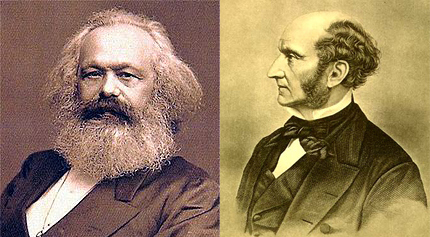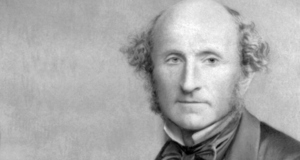On Freedom and Progress: Comparing Marx and Mill
By
2013, Vol. 5 No. 11 | pg. 1/2 | »
KEYWORDS:
This essay compares Karl Marx’s and J.S. Mill’s understandings of freedom and their analyses of the impediments to its realization. First, this essay argues that the two philosophers share the same premise that progress is possible and that mankind has the capacity to drive it. Second, this essay argues that while their conceptions of freedom differ, both see freedom as an end in itself. Then, the essay argues that while their views on what is necessary for progress differ, they share an understanding of human nature’s basic tendancy for self-cultivation. What distinguishes them, however, is their understanding of man’s relationship to their community and their advocacy for change. In Marx’ and Mill’s philosophy, they share the premise that progress is possible. Progress is defined as “development towards a… more advanced condition.”1 For Marx, progress is demonstrated through his account of historical materialism. Historical materialism places changes in economic system as the basis for changes in the superstructure of society. Changes in economic system are determined by technological transformations. For instance, with the transformation introduced by the Industrial Revolution, the economic system of feudalism was replaced by capitalism. Consequently, the superstructures associated with feudalism, such as serfdom, were eliminated by the bourgeois revolution, which introduced a new superstructure and new classes (i.e., bourgeoisie and proletariat).2 Hence, implicit in Marx’s account of historical materialism is that progress is possible. In addition, Marx emphasizes that mankind has the capacity to drive progress. Since mankind is the only common denominator in all episodes of economic transformations in history, Marx argues that while the material condition of society shapes mankind, mankind can also shape society.3 The significance of this capacity is that upon realizing it, mankind has the power to make human emancipation possible by transforming the economic system of capitalism.4 Hence, Marx makes it his task to reveal mankind’s capacity.5Similarly, Mill acknowledges that progress is possible. Rather than demonstrating it through change in the economic system, Mill shows progress as advancement toward liberalism. On the religious front, the development of religious toleration through the European religious wars marked the first steps toward adopting liberal value of non-interference in personal beliefs.6 On the political front, Mill observes the decentralization of power from knots of individuals to masses as a foundation for the transformation of states.7 Thus from constitutionalism to representative democracy, liberalism was progressively realized.8
Karl Marx (left) and John Stuart Mill (right). Mill also stresses the capacity of mankind in driving progress. For example, when Martin Luther initiated the Reformation, Protestantism rose to challenge the dominant religion of Europe.9 Thus, Mill says “the real advantage which truth has… [is that] in the course of ages there will…be found persons to rediscover it…until it...withstand[s] all subsequent attempts to suppress it.”10 In other words, truth – that is liberalism – is inevitable in historical progress precisely because there will be rational individuals to justify its inevitability and push liberalization of thought. Hence, Mill too emphasizes mankind’s capacity for change and progress. But there are considerable differences between the Marxist and Millsian perspective, firstly surrounding their differing conceptions of freedom. Marx conceives freedom as the development of human capacity through non-instrumental labour as an end in itself. In capitalism, labour becomes a marketable commodity. Instrumental labour is labour reduced to meaningless tasks to maximize efficiency, but stripped of the creative experience. It serves to profit the bourgeoisie, who are owners of the proletariat’s labour and deprive them of the means for self-cultivation.11 Not only does the act of labour become alien to the proletariat, they are alienated from each other.12 Conversely non-instrumental labour epitomizes human creativity.13 By consciously willing non-instrumental labour as an end, mankind can be free from the alienation of capitalism that denies it of the human essence, maximizing self-cultivation.14 Therefore, freedom is conceived as an end in itself. In contrast, for Mill freedom is the absence of coercion, which can take two forms: legal coercion and social coercion. Through a representative democracy, the majority within politics has the legal ability to impose its will upon the minority.15 More importantly, the majority can also impose conformity by dictating customs.16 Freedom entails living in absence of coercion, a condition which leads Mill to condemn limitations, through social coercion, on freedoms of expression, association, and action.17 For instance without freedom of expression, one can never discover the convictions behind one’s own view because debate with a contrary view would be disallowed.18 Without freedom of action and of association, there can be no exploration or progress in the diversity of acceptable lifestyles.19 Consequently, society remains stagnant. Freedom, therefore, is the absence of coercion and paves the way for social progress. Although the philosophers define freedom differently, both see freedom as an end in itself. According to Marx’s definition of freedom, because conscious development of human beings is desirable, freedom is viewed as an end in itself. For Mill, freedom of speech, of association, and of action have subsequent motivations: they are crucial for progress. However, freedom of choice is an end in itself. As Mill says, “… though the customs be both good as customs… yet to conform to custom… does not… develop…human faculties…exercised only in making a choice.”20 It is evident that freedom of choice is crucial to the development of individuality. It is an end in itself, because utilizing human faculties to make choices is beneficial for personal development. Thus, the aspect of treating freedom as an end in itself can be observed in both philosophers. Nonetheless, another distinction can be made. For Mill, freedom is necessary for progress. It is necessary because it allows for the existence of geniuses who do not conform to majoritarian norms.21 Einstein was absent-minded when it came to conformity, but single-minded when studying physics. It is this kind of genius that exposes new ways of living to improve society, and it is freedom that allows him to do so. For Marx, struggle is necessary for progress; struggle against the impediment to freedom – the bourgeois state. The bourgeois state claims to represent the universal interest; in fact, it masks the reality of the economic dominance of the bourgeoisie. The justification for the bourgeois state is the opaque and deceptive institution of bureaucracy. As Marx says, “In the bureaucracy the… state interest and particular private aim is established in such a way that the state interest becomes a particular private aim over… other private aims.”22 The implication is that the private interest of the bourgeoisie to maximize capital is represented as public interest, thus naturalizing the exploitative means that the bourgeoisie impose at the expense of the proletariat. Furthermore, exploitation of the bourgeoisie impedes the realization of freedom. Under the conditions of capitalism, the proletariat are reduced to the primitive activity of mere self-sufficiency.23 The significance of this condition is that rather than directing labour toward self-cultivation, “forced labour”24 is directed at producing something alien to the proletariat. In addition, the condition of capitalism alienates not only the proletariat, but also the bourgeoisie itself. This is because the bourgeoisie no longer has need of using labour for cultivation. They are reduced to alienation and subjected to false consciousness precisely because they do not labour to shape the world and because they are not aware that they are deprived of this ability. For progress to happen and freedom to be realized, a struggle against the bourgeois state must occur.Continued on Next Page » Suggested Reading from Inquiries Journal
Inquiries Journal provides undergraduate and graduate students around the world a platform for the wide dissemination of academic work over a range of core disciplines. Representing the work of students from hundreds of institutions around the globe, Inquiries Journal's large database of academic articles is completely free. Learn more | Blog | Submit Latest in Philosophy |



















